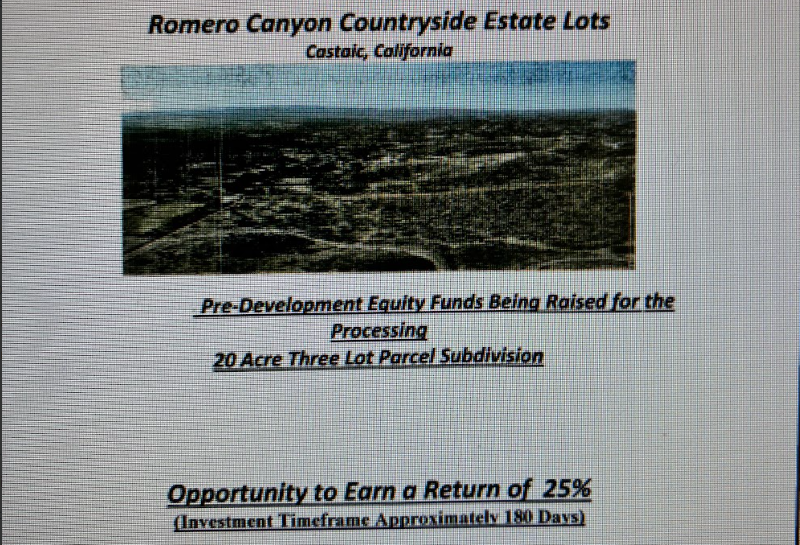An award-winning Realtor, the owner of a decades-old title company and a former Santa Clarita Valley congressman are among the plaintiffs who have sued a local developer, claiming he promised big returns quickly, but failed to deliver.
Court claims count more than $4 million in losses to the questionable loans that promised high returns, with several of the alleged victims saying Ed Poulin not only took advantage of their trust, but also that their losses represent their life savings and retirement funds.
More than one used the phrase “Ponzi scheme,” referring to a scam in which investors are promised high returns, and then the scammer typically strings along investors by making false promises, and often even paying back earlier investors with later victims’ funds.
The Signal obtained copies of 10 complaints that detail claims about a handful of properties, including the Valley Street Villas in Newhall; Sand Canyon Villas in Sand Canyon; and two properties in Castaic, Romero Canyon and Violin Canyon.
Poulin has not made himself available for an interview in response to numerous requests over the past two weeks.
On Friday, he issued a statement through his attorney, Hunt Braly, regarding the claims in the lawsuit:
“My development companies have had every intention on making investor payouts on the projects in question and have always provided excellent service to our residential customers,” he wrote, adding that he could “not recall ever having a lawsuit until this situation.”
Several of the victims contacted by The Signal, including former Rep. Mike Garcia, R-Santa Clarita, declined to talk about what happened.
For his case, Garcia said the matter was resolved, and he’d rather not discuss it.
His attorney, Steffanie Stelnick, confirmed Thursday that Poulin paid back Garcia. Court records and victim statements indicate he’s the only one of the plaintiffs Poulin has paid back in full.
Stelnick did say she was able to obtain one other judgment for a couple she represents with a claim against Poulin.
Others have refused to talk, citing promises Poulin has made to repay them if they stay quiet.
Braly said all of the cases are in “various levels of settlement,” but he could not explain why Garcia was the only one whose case had been completely resolved.
“I don’t think there’s a reason why one over the other. It may have been timing, may have been first in line and then first one who filed an action, any number of reasons.”
Early investor
Like several of those who claimed to have lost money to Poulin’s promises, Monica Barkley was no stranger to the SCV property market.
In fact, the longtime local Realtor touts almost four decades of experience on her website, SCVProperties.com.
She was the first of the plaintiffs to invest in Valley Street Villas.
It was one of the projects that Poulin pitched that he presented in a very professional-looking binder full of opportunities, according to another investor-turned-plaintiff.
Barkley said she’s known Poulin for years but declined to comment on the case when reached by phone last month.
In her lawsuit, she alleges that Poulin owes her several million dollars, including interest and attorney fees, due to several investment loans that were never paid back.
Her first investment with Poulin was Sand Canyon Villas, for which Barkley gave Poulin $88,592 in accordance with their Nov. 5, 2019, agreement, according to the lawsuit.
The lawsuit then states a series of actions by Poulin that are echoed in several other complaints against him.
In May 2020, about two months after the COVID-19 pandemic hit, Poulin approached Barkley and asked for an extension, to which Barkley agreed. Now Poulin was to pay Barkley a total of $105,420 by Dec. 19, 2020.
While Barkley was awaiting repayment, she made another investment with Poulin, agreeing to loan him $763,715.60 for the Valley Street Note for a project off Lyons Avenue and Valley Street.
In March 2023, Barkley agreed to give Poulin more time, extending the note to Aug. 30, 2023, which was then extended to April 2024. On April 25, 2024, Poulin promised to pay Barkley $1,004,298 for the principal and the interest on June 30, 2024, according to the complaint.
The complaint alleges that didn’t happen.
Instead, on Oct. 18, 2024, Poulin issued a check for $1,029,615.26 in an attempt to pay back Barkley. But the check bounced, the complaint alleges.
When the check bounced, according to Barkley’s lawsuit, is when she became aware of Poulin’s “true intentions about the aforementioned loans.”
In April, she filed suit again, citing the Sand Canyon Villas and 12th Street and Village Homes as well.
Barkley’s latest lawsuit alleges Poulin and his companies are: “both legally and financially insolvent; have been selling their assets and transferring the proceeds out of the company without paying plaintiffs; are unable to repay their debts as they become due; and have been issuing checks to third parties which have returned unpaid by their banks for insufficient funds.”
In her lawsuit, Barkley alleges the sum owed from the unpaid loans and alleged fraud is now more than $3.4 million.
Women’s group
Sharen Calkins’ lawsuit shares a similar story.
Calkins declined to comment for this story through her attorney, Daniel Chrystal.
The 73-year-old retiree states in her lawsuit that after working as a nurse at Kaiser for years, she was fired while on a leave of absence, and she was unable to obtain a medical clearance to return to work.
“Calkins accessed her retirement savings, amounting to approximately $500,000, and sought to judiciously invest her retirement funds,” according to the complaint.
Aware of the risks in investing, Calkins joined an all-women investor group, which allowed for the sharing of information, per the lawsuit.
The group believed their significant pooled capital gave them more negotiating power with investment opportunities, potentially securing better terms or access to exclusive deals, the lawsuit says.
She visited several properties, including Valley Street, in an effort to do her “due diligence,” according to the lawsuit.
Poulin’s promised returns were enticing. Historically, the S&P 500, a common stock index, returns at a rate of approximately 6% to 7%, adjusted for inflation. The promissory note on the Valley Street property promised 22%.
Based on the promise of about three times the average return, Calkins withdrew $150,000 from her Kaiser retirement fund to invest in the Newhall property in October 2022.
Still trusting in the potential of the investment, Calkins continued to invest around the same time, putting $250,000 into a project called Romero Canyon, and another $100,000 in a Violin Canyon project.
While Poulin promised returns in the neighborhood of 22%, Calkins knows now the best she can hope for in a court award is a 10% return, according to the lawsuit, but she hasn’t seen any of her investment back.
A trusted name
Barkley stated in her lawsuit that Poulin was a trusted friend and an experienced Realtor before getting into development.
The two had known each other for years, which was why Barkley allowed herself to be assured by Poulin’s claims that, despite the delays, the investment returns would be paid once the projects were built, she states in her lawsuit.
Taryn Cain, who moved away from the SCV a few years ago, said she invested with Poulin because she wanted to support a local businessman.
“I just remember him selling homes back in the ’90s. I remember seeing his name on signs, and so that’s kind of how I … I thought, well … I had gotten a postcard in the mail, and it was for investing with this PWP property,” she said, referring to one of Poulin’s business entities. “And I sat on it for quite a while and had some other opportunities, and I just thought, ‘You know, he’s local. He’s known here in the valley. I’ll give him a call.’”
That was around September 2023, she said.
“I had never heard anything bad about him,” she added. “A lot of times, Realtors, if they’re doing something shady, it’s such a small community, they’re going to be … it’s known.”
Poulin presented a very professional binder filled with potential investment opportunities.
“The reason why I chose Valley Street Villas is because it was the one that was going to fund the quickest, because it was already in the works,” she said.
Cain also said she’s invested in properties before, and said she understood delays.
Inspections can push things back. Permits can get held up.
“But once (the Newhall units) were all sold, that’s when the problems started,” she said.
When it came time for her to be paid back, she shared a story similar to ones claimed by other plaintiffs.
“Promises, yeah, promises — the checks are going to be cut,” she said of her conversations with Poulin from that point.
“He would text me and say, ‘You’ll receive it on Sept. 11 (2024). And then Sept. 11 comes, and he was, ‘Oh, I have to redo everybody’s checks now, you’re going to get it by Friday.’ And then … Sept. 27, there was a problem with the funding of a construction lender. So this check that he had sent me, he had posted it for Sept. 30, and he asked me to hold it. Sept. 30 came and he said, ‘Can you please still hold it?’”
She said he told her the property closed on Oct. 30, 2024.
“So finally, it closed on Oct. 30, he told me, ‘OK to deposit check on Oct. 31,’” she said, adding that check was dated Sept. 30.
When she deposited the check for her investment and interest amount, it came back as having nonsufficient funds.
In his statement issued Friday, Poulin blamed market forces for his challenges in paying people back.
“There have been many headwinds in the economy in the last several years as many people are aware of,” Poulin’s statement read. “Our company losses were generated when the real estate market slid along with increases of 25 to 30% on materials and labor, which caused large losses on several projects. We are working very diligently to settle with each of our investors.”
In a phone interview Friday morning, Poulin’s attorney, Braly, said he wanted to specifically refute any claims of a Ponzi scheme, saying these were real plans that suffered from a downturn in the economy. Valley Street, “which started it all,” Braly said, suffered real losses and debts that Poulin is trying to pay back.
“In this case, the project was built. Other projects are being developed and have either entitlements with these approvals to go forward or close to getting approvals to go forward,” Braly said. “They’re real projects, real development, real activity.”
Caveat emptor
A couple of victims who spoke on background described Poulin as a “wheeler-dealer,” but they never had any sense that he would not return the promised investments.
An attorney working on the case shared a notice of default sale on the Sand Canyon property that indicates it will be sold 11 a.m. Aug. 20 at a foreclosure sale in Pomona.
There was also the trust factor.
More than one client said they contacted Poulin about speaking to The Signal regarding the lawsuits, and they said he asked them not to go on the record in promise that he would pay them back.
The clients didn’t go on the record, and there has been no indication that Poulin has paid them back.
Later, an alleged victim said they received a text from Poulin about a pending news story.
The victim said Poulin texted that the reporting on the situation is “unfortunate,” because it could hinder his ability to get additional private funding to pay back previous debts.
“We are currently in the process of marketing and selling development properties and utilizing other methods for past investor payouts,” Poulin’s Friday statement read. “We intend to stay in business, reorganize and continue to provide excellent homeownership opportunities along with quality residential apartments for our customers.”
He also described the investor pressure as “an abuse” of the system.
“There are certain individual investors who we believe are acting in unison to attempt to bring pressure outside of the civil court process, and our negotiations, in order to leverage their civil case more prominent and in their favor,” he said. ‘We believe that is an abuse of the civil court process.”








